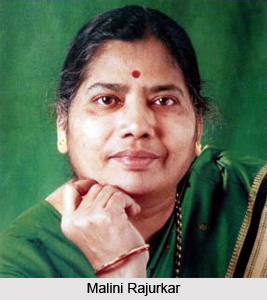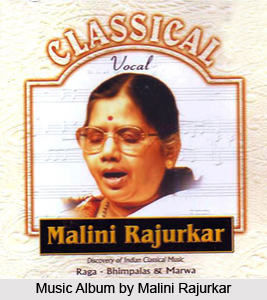 Malini Rajurkar is a renowned Hindustani classical singer, who belongs to the Gwalior Gharana. Malini Rajurkar, used to be a mathematics teacher, but eventually became one of the finest of women singers in the nation. She got married to Vasantrao Rajurkar, who inspired and supported her singing career further. She has specialised in the performance of Pandu-Nrupati Janak Jaya and Naravar Krishnasamaan, for which she has become well renowned in India and abroad.
Malini Rajurkar is a renowned Hindustani classical singer, who belongs to the Gwalior Gharana. Malini Rajurkar, used to be a mathematics teacher, but eventually became one of the finest of women singers in the nation. She got married to Vasantrao Rajurkar, who inspired and supported her singing career further. She has specialised in the performance of Pandu-Nrupati Janak Jaya and Naravar Krishnasamaan, for which she has become well renowned in India and abroad.
Early Life of Malini Rajurkar
Malini Rajurkar was born in the year 1941 into an archetypal Indian middle class family in Ajmer, Rajasthan. She graduated with mathematics from Savitri Girls` High School and College, Ajmer. Later, Rajurkar taught the same subject for 3 years in that school. She got a 3-year scholarship from Sangeet Nipun, from the Ajmer Music College and completed her graduation under the tutelage of Govindrao Rajurkar and Vasantrao Rajurkar, his nephew. Malini Rajurkar was later married to Vasantrao Rajurkar.
Career of Malini Rajurkar
 Malini Rajurkar is one of the foremost of senior women singers in the country. Her name is today associated with the quintessence of Gwalior Gharana. Malini Rajurkar has excellently performed in various music festivals in the country, such as Tansen Samaroh (Gwalior), Shankar Lal Festival (Delhi), Gunidas Sammelan (Mumbai) and Sawai Gandharva Festival (Pune). She is most popular for her rendition of 2 Marathi Natyageete, Naravar Krishnasamaan and Pandu-Nrupati Janak Jaya. She is also much admired for her authority over the Tappa genre.
Malini Rajurkar is one of the foremost of senior women singers in the country. Her name is today associated with the quintessence of Gwalior Gharana. Malini Rajurkar has excellently performed in various music festivals in the country, such as Tansen Samaroh (Gwalior), Shankar Lal Festival (Delhi), Gunidas Sammelan (Mumbai) and Sawai Gandharva Festival (Pune). She is most popular for her rendition of 2 Marathi Natyageete, Naravar Krishnasamaan and Pandu-Nrupati Janak Jaya. She is also much admired for her authority over the Tappa genre.
Malini Rajurkar, though trained in the pristine tradition of Gwalior, was deeply influenced by the singing of Kumar Gandharva. She was also taken by the individualistic approach of Pt. Jitendra Abhisheki to Ragas. The heavy sonority of voice, possessing depth, drive and range, gives Malini`s music its depth. Her tonal purity, maturity of imagination and steadiness of notes, give her Khayals a sense of classical solidity and weight. Keeping in tune with the best traditions of Gwalior, she is perhaps one of the few exponents of Tappa, as also one of its finest singers in the country. The traditional Ragas which form part of the Gwalior repertoire would find Malini in excellent form. Her excellent recording of Jaunpuri is built on the durable foundations of Gwalior Gayaki. But nowhere does she impress so much as she does in her live recording of Bhoopal Todi (HMV). Similarly, her Bhoopali Music possesses verve and lyricism as also her Shankara and Kedar.
Malini Rajurkar`s skill and experience is the envy of many of her contemporaries. Even though she does not perform frequently, over the years, she has become a reputed name in this field. She earned it through finding that rare aesthetic balance which even the best take decades to locate and perfect.




















